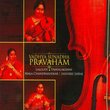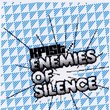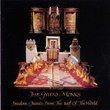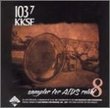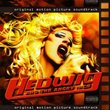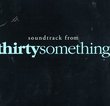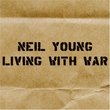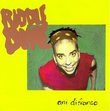| All Artists: Joan Baez Title: Joan Baez/5 Members Wishing: 4 Total Copies: 0 Label: Vanguard Records Original Release Date: 1/1/1964 Re-Release Date: 7/9/2002 Album Type: Original recording reissued, Original recording remastered Genres: Folk, Pop Styles: Traditional Folk, Contemporary Folk Number of Discs: 1 SwapaCD Credits: 1 UPCs: 015707970020, 0090204942367 |
Search - Joan Baez :: Joan Baez/5
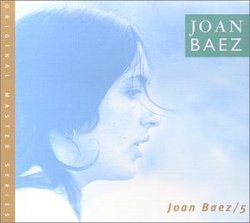 | Joan Baez Joan Baez/5 Genres: Folk, Pop |
Larger Image |
CD DetailsSimilar CDs
Similarly Requested CDs
|
CD ReviewsA lament for the last of the old ballads E. A. Lovitt | Gladwin, MI USA | 02/21/2003 (5 out of 5 stars) "This CD is forty-seven minutes of mixed emotions for Joan Baez fans. After this album, the singer "went on to mine the richness of contemporary songwriters" according to the liner notes.If you prefer the acoustical guitar and the traditional ballads as I do, this is Joan's last album that features this kind of music, and she was already crossing over with songs like "Birmingham Sunday (track 9)." Muddled in with the contemporary (well, 'sixties) songs, this CD also has two Child Ballads, an eighteenth-century broadside about a race horse, ballads sung by dead men, and a lovely poem by Lord Byron that is set to music.In other words, traditionalists, here are a few of our favorite songs--the last known to be recorded by Joan Baez:"Stewball"--According to the Thoroughbred Heritage web site, Skewball (not Stewball) really was a racehorse (possibly a skewbald) by the Godolphin Arabian, out of a Whitefoot mare called Bandy . Samuel Sidney ["The Book of the Horse", 1875] stated that Skewball "...won a great number of plates and prizes in England, and one famous match in Ireland." This match became the subject of a ballad, "Skewball" or "Stewball," which has endured, in varying forms, to the present day. Joan Baez isn't the only folkie to sing about Stewball. Peter, Paul, and Mary, Leadbelly, and the Kingston Trio also recorded versions of this ballad. The 'little gray mare' who raced against Skewball is named 'Molly,' 'Miss Sportsly,' or 'Griselda' in the various eighteenth century broadsides from which this ballad originated. Joan sings this song high and tremulous like a child who loves the silver-bridled Stewball and rejoices when "the gray mare she stumbles and falls to the ground." "The Death of Queen Jane (Child #170)--a version of this ballad appears as early as 1612 and tells of the death of Jane Seymour, third wife of Henry VIII of England. Joan's clear soprano and droning accompaniment are especially effective for this ballad. "The Unquiet Grave (Child #78)--When Joan sings this ballad she leaves out the strongest verse: "You crave one kiss of my clay-cold lips;/ But my breath smells earthy strong;/ If you have one kiss of my clay-cold lips,/ Your time will not be long." This song recounts the almost universal belief that excessive grieving for the dead interferes with their repose. The hair on the back of your neck will rise up when the dead man speaks to his grieving lover in Joan's plaintive, eerie lament."So We'll Go No More A-Roving"--It was during the famous Carnivale of Venice, when lovers roamed the streets in masks and elaborate costumes, that Byron wrote the poem which furnishes the lyrics to this song. Joan's yearning soprano perfectly conveys the spirit of the poem: Byron, grown fat and pensive, dressed in a lavish dressing gown and gazing out of his window in the Palazzo Mocenigo, thinking of what might have been. This poem was turned into a sea shanty shortly after Byron penned it, so it has a venerable history of being put to song. A more modern version of the song (I am not making this up) is "So We'll Go No More A-Cruisin.""Long Black Veil"--Joan records this song on one of the two bonus tracks of this CD (the other extra is "Tramp on the Street"). The lyrics, written by Grand Ole Opry veteran Danny Dill, tell the story of a man wrongfully convicted of murder. He goes to the gallows rather than compromise his best friend's wife -- in whose arms he was lying when the crime was committed. The song's central image is of the grieving adulteress walking the hills "in a long black veil," returning over and over to her hanged lover's grave. Dill drew his ballad from several sources, including stories he had read of a woman who supposedly haunted Rudolph Valentino's grave. The voice is that of the hanged man, who you hear singing from beyond the grave (see also above: "The Unquiet Grave")." Best of Early Baez Bill B Carlsen | Lompoc, CA, USA | 07/17/2002 (5 out of 5 stars) "This is Baez at her best, and the folk revival at it's best. The variety of songs and the performances are the first peak of a long career. It is woth it alone for the Villa Lobos interpretation." A True Artist at the Height of Her Powers James Morris | Jackson Heights, NY United States | 03/19/2008 (5 out of 5 stars) "It's funny how time can change so totally what we cherish and believe about art. As a music historian once noted, all people hear music, but few people actually listen. One upon a time, at a much younger age, I thought that because I listened to music all the time, I knew everything there was to know about it. As a young, "hip" urban gay man, exposed to all the theatre and music that my native city, New York, had to offer, I used to think I had it all sewed up. I was proud of my knowledge of Jazz, theatre, and other popular music that I thought of as "sophisticated", choosing to turn my nose up at country, folk, blues, rock, and anything else my friends didn't listen to.
The older I get, the more I realize that I didn't know a fraction of what I thought I did, and I am indeed still learning what it truly good. My taste in music began to change when I was in my mid-twenties, and today, (fast approaching my mid-fifties) I have learned to embrace many forms of music at their most basic, and for several years now I have been content to call myself an enthusiast of "roots" music. Yes, I still love Jazz and even Broadway show tunes, but my preferences now lean towards blues, country (including its many sub-genres) and folk music. I own about 20 CD's of Joan Baez, from all periods of her output. I found Joan fairly late in her career, but fairly early in the "rebirth" of my concept of what good music is. Of all the folk singers I admire, there are few I continue to return to again and again as much as I do Joan Baez, and Joan Baez 5 is easily my favorite above all her other efforts. Joan Baez 5 starts with the finest version of Phil Ochs' There But For Fortune that I know of, including the definitive version by Mr. Ochs. Her perfect soprano accents the hauntingly beautiful lyrics, which seem to grow more topical as the years go by. "Show me the country where the bombs had to fall, and I'll show you a young land with so many reasons why, there but for fortune go you or I..." Beautiful? Indeed, but words and accolades lose their meaning and soon pale beside such truth and beauty. The death of Queen Jane, a "true story" about Jane Seymour (possibly Henry VIII's only true love) dying in childbirth is both haunting and unforgettable; it's both a perfect musical statement and one of the standouts on a stellar album. It is interesting to note that, more than any other singer, Joan Baez's take on almost any song is apt to outshine the most celebrated renditions of the same song, even those by the songwriter; anyone who doubts this need only listen to her version of Bob Dylan's It Ain't Me Babe, or Johnny Cash's I Still Miss Someone. In fact, I am ready to admit that her version of the Cash song here is even better than the rendition recently recorded by my favorite vocalist, Tracy Nelson, and THAT (as far as I'm concerned) is really saying something. Joan Baez does not need to prove that she has a classically trained voice; virtually everything she tackles is sung in a high, clear soprano that almost any opera diva would be proud to display. Nevertheless, when she does turn her attention to the occasional well-chosen classical piece, such as Villa-Lobos' Bachianas Brasileiras, it's really something to behold. I sometimes halt the CD on this track and play it through four or five times, savoring each note and allowing myself to marvel at the joy of such a perfectly sung aria. Following classical music with a straight-forward folk song such as Go Away From My Window is a feat many lesser vocalists wouldn't dare attempt, yet the mood slides effortlessly from classical to contemporary. I have heard this song by a variety of singers (including a concert version by Marlene Dietrich (!) that surprised the heck out of me) but once Joan has finished with it, nobody else can touch it. This brings us to the album's true highlight. To quote the liner notes, "September 15, 1963, four little girls went to Sunday school one Sabbath morning and never came home. Instead, they left their blood upon the church house wall...Sunday dresses torn to shreds by dynamite, victims of the race war in the American South". Joan sings Birmingham Sunday with a cool detachment that belies her (and our) rage and sorrow. It's been 45 years since the actual event, and although I was only 9 at that time, I can still recall that shocking news bulletin. I wept then, and I weep today. There is something about the quiet dignity of Joan's voice that makes me re-live the sorrow and the shock each time I hear this song, and something about her delivery that renews my conviction that we must never forget, and teach the next generation and the next as well that this shameful event must never be repeated. It's funny how music means different things at different times, and strange how the passage of time can alter one's perception of what is truly important. Although I have not managed to acquire Joan Baez's complete output (I've been slowly working on it for years, believe me) I can't imagine that any record by almost any singer could move me more. And THAT'S what I call art. " |


